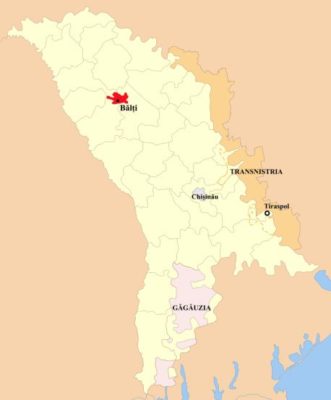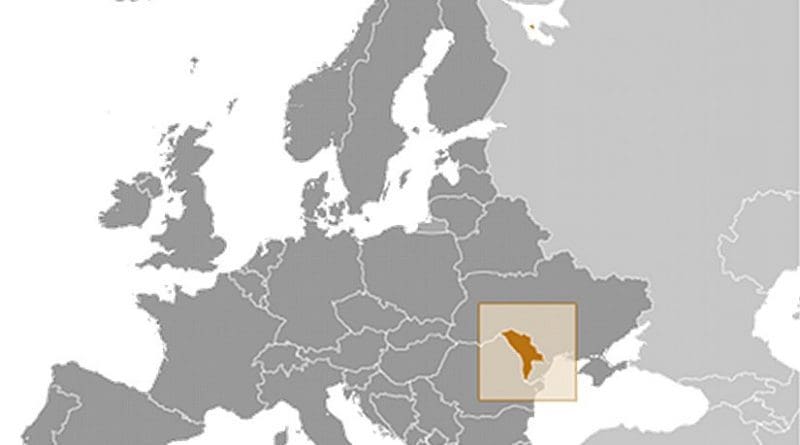Moldova’s Presidential Election Heads To A Runoff – Analysis
By Published by the Foreign Policy Research Institute
By John R. Haines*
(FPRI) — Moldova held its first nationwide presidential election in sixteen years on Sunday, 30 October with 49.03 percent of registered voters casting ballots for nine candidates. The first-place finisher was Igor Dodon, who represents the Russia-favoring Socialist Party also known as the “PSRM” (Romanian: Partidul Socialiştilor din Republica Moldova; Russian: Partija socialistov Respubliki Moldova). Mr. Dodon received 48.5 percent of votes cast, falling just short of the 51 percent threshold required to avoid a runoff. With nearly all ballots counted, Mr. Dodon held out hope late Sunday that polling stations in Gagauzia and Moldova’s third-largest city, Bălți, would push him over the threshold, but in the end, he still fell short.

The runoff election is scheduled for Sunday, 13 November, when Mr. Dodon will face the second-place finisher, Maia Sandu of the Action and Solidarity Party known as the “PAS” (Romanian: Partidul Acțiune și Solidaritate). She received 38.2 percent of votes cast in the first round. The next nearest candidate was Dumitru Ciubaşenco, a journalist and the candidate of the populist Our Party (Partidul Nostru), who was far behind at 5.56 percent.
Ms. Sandu is Moldova’s Education Minister and a forceful advocate for the “pro-European direction” (proyevropeyskogo kursa) pursued by the current national government in Chişinău. Boris Shapovalov, vice chair of Moldova’s abjectly pro-Russia civic organization Motherland-Eurasian Union (Rodina–Yevraziyskiy Soyuz),[1] said this about Ms. Sandu:
Maia Sandu is in reality, as we say in Moldova, the presidential candidate of the European Union and the United States Embassy.[2]
Igor Tulyantsev, who leads Motherland, said in September that the election was a “false choice” between the European Union and the Russian Federation:
EU accession is the wrong direction for Moldova. We have no one in the EU who’s asking us to join. So now Romania offers this scheme: join with us, liquidate Moldovan nationhood, and you’ll be part of the European Union—that’s the main argument of the political elites.[3]
“Oh no, not Dodon, God fobid! We’ll lose everything” (Of, numai nu Dodon, doamne-ferește! Vom pierde totul!). That was the reaction of Mihai Ghimpu to the prospect of Mr. Dodon winning the runoff election. Mr. Ghimpu—he leads Moldova’s Liberal Party (Partidul Liberal) and is a former acting Moldovan president (September 2009-December 2010)—is skeptical that Ms. Sandu could prevail in the runoff election:
Bringing in 150 thousand more people than in the first round and getting all of them to vote for you, I think that’s much, much harder than shouting that Ghimpu is treacherous . . . [4]
That last comment is a reference to Ms. Sandu’s call on Wednesday evening, 26 October (five days before Sunday’s election) for Mr. Ghimpu to withdraw from the race in order to deny Mr. Dodon an outright majority.[5] Dorin Chirtoacă— Chişinău’s mayor and a Liberal Party colleague of Mr. Ghimpu, whom he represented in discussions with Ms. Sandu—said that Mr. Ghimpu agreed to withdraw before Sunday’s election on the condition that Ms. Sandu would “agree to sign a union agreement with Romania.”[6] She refused, stating in a widely reported response, “Maia Sandu and Dorin Chirtoacă don’t decide on a union. The people decide this issue, if you believe in democracy.”[7] Mr. Chirtoacă replied:
We must be united because we’re all in the same boat, so disagreements only benefit Dodon. If we pull out, you’ll say you don’t need Ghimpu’s votes. It’s no good to be so arrogant on the eve of a presidential election. There’s no way forward other than union [with Romania] over the next four or eight years.[8]
While Mr. Dodon outpaced Ms. Sandu in the first round of voting by a healthy margin, the outcome of the second-round runoff election is by no means clear. Many factors that may affect the results of the runoff election are difficult to weigh with precision. One of these is the open question of how many of the half (50.7%) of Moldova’s registered voters who did not participate in the first-round will decide to vote in the runoff election.
Another difficult to rate factor is the influential role of Moldova’s oligarchs led by Vladimir Plahotniuc, the country’s so-called “Grey Cardinal” [Russian transl.: seryy kardinal; Romanian: eminența cenușie]. Mr. Plahotniuc leads the Democratic Party [Romanian: Partidul Democrat din Moldova; Russian transl.: Demokraticheskaya partiya Moldovy], whose candidate in the October presidential election, Marian Lupu, withdrew four days before voters went to the polls. While the move was characterized as an effort by Mr. Plahotniuc to help Ms. Sandu, she condemned it as an effort to “compromise me,” adding “Plahotniuc, as a matter of fact, wants to help him, Dodon.”[9] She called Mr. Lupu’s withdrawal “desperate” and “a poisoned apple”[10] (un măr otrăvit) and posted a statement on her Facebook page that ended with the following:
Neither I, nor the Moldovan people, need Plahotniuc’s support. The people will know how to make the right choice.[11]
Ms. Sandu kicked off her runoff campaign by asserting, “Yesterday’s elections showed very clearly that we have a cardboard government” (Vcherashniye vybory pokazali ochen’ yasno, chto u nas kartonnoye pravitel’stvo).[12]
I will cooperate with the Government if they want to do the right things, and if they want to abuse power, to mimic reform, and so on, I will not cooperate with them.[13]
She went on to demand that Chişinău allow “diaspora” Moldovans to vote in the runoff on the basis of presenting “a valid identity card” rather than a valid Moldovan passport. She also demanded Chişinău open more polling stations abroad.[14]
Mr. Dodon set his goal in the runoff at 60 percent[15] promising “to be a good president, both for those who want to see Moldova move closer to the EU and for those who want to be closer to the Russian Federation.”[16]
Some social media commentators have observed sardonically that the country’s first round of voting occurred on Halloween and that the second round will be held on the 13th.[17] Another commentator quipped that the key to predicting the outcome of the runoff election is “mathematics and conspiracy theories”.[18] Those conspiracy theories range from Transdniestrian interests that face being marginalized by a Dodon-led national government, to United States Ambassador James Petit “tightly holding her [Ms. Sandu’s] hand and controlling the entire political process.”[19] Some suggest Romania and Ukraine will also exert influence in Ms. Sandu’s favor, fearing a pro-Russia Dodon government on their border. The mathematics differs between the two candidates: Mr. Dodon needs to prevent Ms. Sandu’s coalition of pro-European parties from mobilizing the electorate, and to keep turnout at or below the level in the first round. She needs to mobilize voters, especially younger voters who turned out in low numbers. One commentator suggests Ms. Sandu may be forced “to agree to cooperate with the de facto leadership of the Democratic Party,” an oblique reference to Mr. Plahotniuc. Others suggest such cooperation would in the end help Mr. Dodon “by putting an end to the protracted debate over who in the race is Plahotniuc’s current favorite.”[20] In the event Mr. Dodon wins, writes political analyst Victor Ciobanu, Mr. Plahotniuc will “rationalize the electoral result” to extract “carte blanche for further political maneuvers” from Washington and Brussels.[21]
Mr. Dodon likely has a slight edge over Ms. Sandu, if for no other reasons given the outcome of the first round and the very contracted runoff campaign. It is uncertain whether the coalition of Moldova’s pro-European political parties expected to coalesce around Ms. Sandu in the runoff will, in fact, do so effectively. So, too, it is uncertain whether Mr. Dodon can overcome the pattern of past Moldovan candidates who win the first electoral round just to lose the second, as occurred in the 1996 presidential election and in the 2011 Chişinău mayoral election. This may in part reflect whether pro-Russian interests decide they are better off with or without Mr. Dodon in Chişinău and whether turnout stays below 50 percent. And then there is the enigmatic role played by Mr. Plahotniuc, who, among other things, has worked hard to develop relationships in Washington. Finally, there is no question that foreign interests—Moscow on the one side, and Washington, Brussels, Kyev, and Bucharest on the other—will play an important, overt role in Moldovan political life through 13 November, and most likely beyond.
About the author:
*John R. Haines is a Senior Fellow of the Foreign Policy Research Institute and Executive Director of FPRI’s Princeton Committee. He is also a Trustee of FPRI.
Source:
This article was published at FPRI.
Notes:
[1] Motherland-Eurasian Union is closely tied to Russian Deputy Prime minister Dmitry Rogozin, who serves as President Putin’s special envoy to Moldova’s separatist Transdniestria region known formally as the Pridnestrovian Moldavian Republic [Russian transl.: Pridnestrovskaya Moldavskaya Respublika; Romanian: Republica Moldovenească Nistreană].
[2] “Igor’ Dodon obespechit prorossiyskiy kurs, Mayya Sandu – proamerikanskiy.” Tsargrad [published online in Russian 30 October 2016]. http://tsargrad.tv/article/2016/10/30/prezidentskie-vybory-moldavija-vybiraet-mezhdu-rossiej-i-gosdepom. Last accessed 1 November 2016.
[3] “Tulyantsev v efire rossiyskogo TV nazval vybory v Moldove «konkursom krasoty oligarkha».” Rodina [published online in Russian 5 September 2016]. http://rodina.md/hronika/710-tulyantsev-v-efire-rossijskogo-tv-nazval-vybory-v-moldove-konkursom-krasoty-oligarkha. Last accessed 1 November 2016.
[4] “Așa grăit-a Mihai Ghimpu: ‘Of, numai nu Dodon, doamne-ferește! Vom pierde totul!’.” Deschide [published online in Romanian 1 November 2016]. http://deschide.md/ro/stiri/politic/2604/. Last accessed 1 November 2016.
[5] “Alegeri în Republica Moldova: Maia Sandu i-a cerut lui Mihai Ghimpu să se retragă din cursă.” Agerpres [published in Romanian 27 October 2016]. http://www.agerpres.ro/externe/2016/10/27/alegeri-in-republica-moldova-maia-sandu-i-a-cerut-lui-mihai-ghimpu-sa-se-retraga-din-cursa-12-08-34. Last accessed 1 November 2016.
[6] Ibid.
[7] ” Dorin Chirtoacă este gata să o sprijine pe Maia Sandu, dar pune o singură condiție.” All Moldova [published online in Romanian 26 October 2016]. http://www.allmoldova.com/ro/news/dorin-chirtoaca-este-gata-sa-o-sprijine-pe-maia-sandu-dar-pune-o-singura-conditie. Last accessed 1 November 2016.
[8] Agerpres (27 October 2016), op cit.
[9] “Maia Sandu despre retragerea lui Marian Lupu: Cu acest măr otrăvit, Plahotniuc vrea să-l ajute, de fapt, pe Dodon.” Moldova.org [published online in Romanian 26 October 2016]. http://www.moldova.org/maia-sandu-despre-retragerea-lui-marian-lupu-cu-acest-mar-otravit-plahotniuc-vrea-sa-l-ajute-de-fapt-pe-dodon/. Last accessed 1 November 2016.
[10] “Maia Sandu: Nu am nevoie de sprijinul lui Plahotniuc, vrea sa-si spele imaginea prin a declara un sprijin FALS pentru mine.” HotNews.ro [published online in Romanian 26 October 2016]. http://www.hotnews.ro/stiri-esential-21377551-maia-sandu-nu-nevoie-sprijinul-lui-plahotniuc-vrea-spele-imaginea-prin-declara-sprijin-fals-pentru-mine.htm. Last accessed 1 November 2016.
[11] Moldova.org (26 October 2016), op. cit. The statement reads in the original Romanian: “Nici eu, nici oamenii din Moldova nu avem nevoie de sprijinul lui Plahotniuc. Oamenii vor ști să facă alegerea corectă.”
[12] “Komanda Mayi Sandu prizyvayet k mobilizatsii vo vtorom ture.” Ava.md [published online in Russian 1 November 2016]. https://ava.md/2016/11/01/komanda-mayi-sandu-prizyvaet-k-mobilizacii/. Last accessed 1 November 2016.
[13] “Mayya Sandu rasskazala kak budet rabotat’ s pravitel’stvom yesli stanet prezidentom.” Publika.md [published online in Russian 1 November 2016]. http://ru.publika.md/mayya-sandu-rasskazala-kak-budet-rabotat-s-pravitelstvom-esli-stanet-prezidentom_1949761.html. Last accessed 1 November 2016.
[14] “Mayya Sandu vydvigayet neskol’ko trebovaniy v kontekste vtorogo tura vyborov.” Panorama [published online in Russian 1 November 2016]. http://pan.md/vyiboryi-2016/mayya-sandu-vyidvigaet-neskolko-trebovaniy-v-kontekste-vtorogo-tura-vyiborov. Lasty accessed 1 November 2016.
[15] “Igor’ Dodon o vtorom ture vyborov: Nasha tsel’ – 60% i vyshe.” Actualitati [published online in Russian 1 November 2016]. http://actualitati.md/ru/vnutrennyaya-politika/igor-dodon-o-vtorom-ture-vyborov-nasha-cel-60-i-vyshe. Last accessed 1 November 2016.
[16] “Igor’ Dodon: YA budu vsenarodnym prezidentom, nezavisimo ot geopoliticheskikh vzglyadov i predpochteniy.” Actualitati [published online in Russian 1 November 2016]. http://actualitati.md/ru/obshchestvo/igor-dodon-ya-budu-vsenarodnym-prezidentom-nezavisimo-ot-geopoliticheskih-vzglyadov-i. Last accessed 1 November 2016.
[17] “Vtoroy tur: Igor’ Dodon ili Mayya Sandu?.” Newsmd [published online in Russian 1 November 2016]. http://newsmd.md/articles/14949-vtoroy-tur-igor-dodon-ili-mayya-sandu.html. Last accessed 1 November 2016.
[18] Ibid.
[19] Ibid.
[20] Ibid.
[21] “Kandidatu v prezidenty ot Partii sotsialistov Igoryu Dodonu ne khvatilo vsego pary protsentov, chtoby stat’ novym glavoy gosudarstva.” Alfanews.md [published online in Russian 1 November 2016]. http://alfanews.md/ru/politica-ru/item/10904-vtoroj-tur-igor-dodon-ili-majya-sandu/10904-vtoroj-tur-igor-dodon-ili-majya-sandu. Last accessed 1 November 2016.

